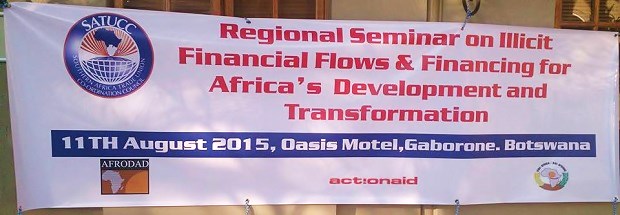News
Endemic poverty, high unemployment Africa’s greatest challenges due to corruption – Muneku

Endemic poverty and high levels of unemployment are the greatest challenges facing Africa due to widespread corruption and illicit financial flows, says Southern Africa Trade Union Co-ordination Council executive secretary Austin Muneku.
Speaking in Gaborone on Tuesday when he officially opened a regional seminar on illicit financial flows from Africa and their negative impact on development, Muneku said massive corruption in many African states had led to the collapse of effective institutions of governance, thereby exacerbating illicit financial flows.
“According to the High Level Panel on Illicit Financial Flows from Africa by the Thabo Mbeki-led Panel, Africa is estimated to be losing US$50 billion yearly. In fact, the same report views this as an underestimate because of lack of accurate data from all African countries. At the same time, Africa, particularly the Southern African Development Community (SADC), is in dire need of resources for development as reflected in the dependency on Official Development Assistance (ODA) as resources from national budgets remain inadequate,” Muneku said.
He said illicit financial flows had devastating ramifications for the economies of Africa and the welfare of the masses through the erosion of the public sector, starving African states of the funds needed for development and driving up deficits for the states’ budgets.
Muneku said there was overwhelming evidence that multinational companies operating in Africa shuttle money and subsidiaries between countries to minimise taxes and at the same time, hiding stolen money in untraceable off-shore accounts.
“The monies being stolen from Africa through illicit financial flows could have been utilised to finance public service provision and efforts in the area of industrialisation towards creating decent jobs for our people. What is encouraging, however, is that governments and multilateral agencies around the world are waking up to this issue of illicit financial flows from Africa, and the pressure of transparency in financial reporting is also growing,” Muneku said.
He further said trade unions had no choice but to join the campaign to urge leaders and governments to adopt measures to curb the haemorrhaging of Africa’s resources while harnessing the same resources and investing them in the productive sectors of their economies to improve both living and working conditions on the continent.
And African Forum and Network on Debt and Development (AFRODAD) policy officer in economic governance Tafadzwa Chikumbu said African countries were in need of tax justice systems to curb illicit financial flows.
“A functional state that can meet the basic needs of its citizens must ultimately rely on its own resources to meet development objectives. We have a situation where our African states look at debt and aid as the most sustainable source of financing development but using a fair tax system, our governments can mobilise domestic revenue, distribute wealth and provide essential services and the much-needed public infrastructure. A functional state should have an efficient and effective tax system that builds a social contract between governments and citizens,” said Chikumbu.
IFFS in Southern Africa Research Methodology Workshop
Specific objectives of the workshop were to:
(i) Establish a common understanding of the focus, scope of work and modalities of implementation of the “Assessing the extent and impact of illicit financial flows in key economic sectors in Southern Africa” research initiative.
(ii) To strengthen the capacity of participants on illicit financial flows research methods and design.
(iii) To review individual proposals and provide inputs towards the development of final research proposals and timeframes.
(iv) Enhance the appreciation of the nexus between the political economy of Southern Africa and illicit financial flows.
(v) To strengthen connections and usefulness of academic research to advocacy efforts





